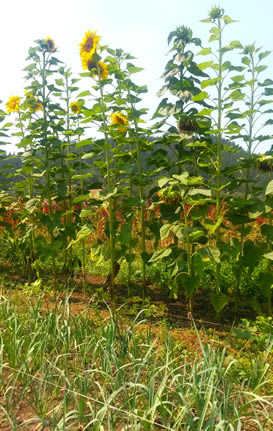Golden Rule Mini-Farm Garden Report:
Autumn Comes to the Mini-Farm
Image: Rachel before quinoa harvest This time of year, the garden is churning with change. The last of summer’s bounty is pulled from the ground, and preparations for winter begin. Fall’s last tomatoes are plucked from their hiding places deep in the retiring plants; a final cucumber is found on a yellowing vine; we pick a whole basket of eggplants and the final crop of potatoes, as one by one the beds are cleared. The first sign this season is coming is the harvest of quinoa and amaranth. Eventually millet, sorghum, and flour corn follow. In just a matter of weeks, the garden is transformed from a forest of tall summer crops to a blanket of new seedlings. Quinoa and amaranth are replaced by winter grains—some we will allow to go to maturity, and others we will harvest early as immature crops for our compost piles in the spring. Winter grains must go in the ground early enough to establish themselves before the short, cold days of winter. In our climate, crops that come out last are replaced by fava beans, which tend to grow larger—and evade black aphid infestations longer—when planted later in the fall. The vegetables we harvest are made into salads, to enjoy the last fresh eating of summer’s crops. At the Golden Rule Mini-Farm house, our winter diet will mainly be grains, potatoes, winter squash, and winter greens like cabbage and kale—plus anything we have managed to preserve in the rush of the summer season. When summer grains are harvested, they are carefully tied and hung in the barn to finish drying, safe from rodents. When the beds in the garden are tucked in for the winter and the rains come, we will head to the barn, using our extra time to thresh and winnow the grains of summer. When you actually live and eat from the land, the harvest season takes on a deeper meaning. A full barn and pantry are reminders of a season well spent, with observations made and lessons learned. Harvest bounty is marked by that unique time of year when we can have the reward of our summer crops and winter storage crops at the same time. We delight in the feast, and we hope your gardens treated you as well this year.
top | Newsletter Home | Article Index | Archive
|




